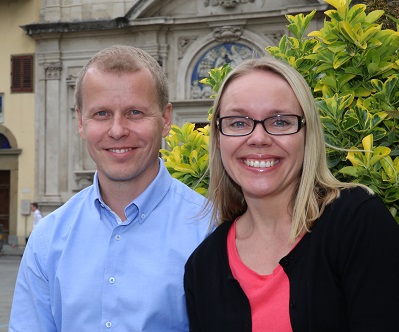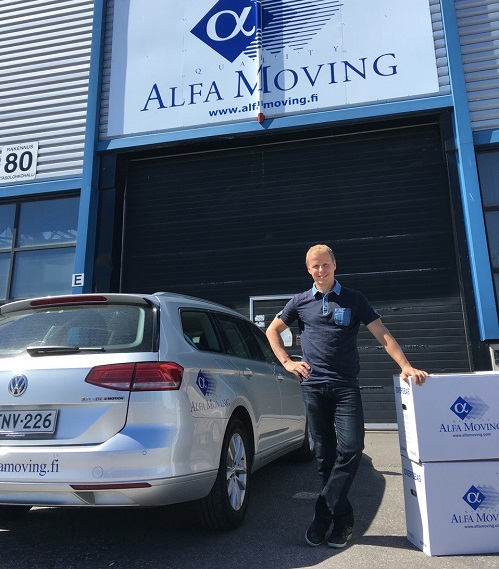The Mover has frequently interviewed luminaries from the industry who have provided their unique insight into the developments that made the industry what it is today. By contrast, here two of the industry’s shining stars, Dennis Westerholm and Sara Lyrum Kronkjaer, both of Alfa Quality Moving, give their thoughts on the rapidly changing industry and what the future might hold.

Dennis Westerholm is managing director of Alfa Quality Moving in Finland, it is a branch of the Swedish parent company set up in 2006 by Dennis and his business partner Beik Leka. Sara Lyrum Kronkjaer has been in the moving business in Denmark for 20 years, first with Aspire Mobility and, for the last three years, with Alfa Quality Moving and Relocation.
Dennis said that the relocation market in Finland had been late to mature. “There are still some difficulties in some more traditional industries because they won’t release the work to us,” he explained. “It’s happening but it’s slow. Customers have large HR departments and like to control things themselves. But eventually we know that must change. They will have to release these HR functions because we can do it faster and more economically than they can. We can already see that in Denmark and Sweden so I believe we are doing the right thing by taking on the consultancy role.”
Indeed in Denmark Sara said that the market has moved much faster. “Customers have changed dramatically,” she explained. “Before we spoke about moves and trucks and airfreight and storage. Three-five years ago it was still relocation services, home search and settling in but now, in our part of the world, they just want to know about our immigration services.”
Both Dennis and Sara agreed, however, on the next big threat to moving companies. Having taken on the relocation companies, either at their own game or as a supplier to them, the next problem was the tax consultants.
“The big accounting companies are in touch with the corporate accounts first because they are providing them with taxation services,” said Sara. “Not many of us are doing tax services. Our competitors, therefore, are suddenly completely new: they have global branding and they know about relocations before we have the slightest idea.”
 Sara said that as the consultancy companies expanded into providing immigration and relocation services about either years ago. They were already providing tax and social security services and saw the opportunity to expand. “Unless we start to hire global accountants it’s really difficult to compete with that because they have knowledge that we don’t have. I don’t think we would want to get into this side of the business but you never know what our industry will be doing in three-five years.”
Sara said that as the consultancy companies expanded into providing immigration and relocation services about either years ago. They were already providing tax and social security services and saw the opportunity to expand. “Unless we start to hire global accountants it’s really difficult to compete with that because they have knowledge that we don’t have. I don’t think we would want to get into this side of the business but you never know what our industry will be doing in three-five years.”
Dennis agrees. “When a big global company in Finland goes for a tender the biggest challenge is for us to be able to provide this tax consultancy service and all that comes with it. It’s a totally different ballgame.” Despite this Dennis believes that companies should not forget about their roots. “We still think of ourselves as movers and that’s nothing to be ashamed of; a lot of our turnover is still coming from international moving. But there are challenges with profitability, margins and controlling costs so we know the market is changing and we need all these other services to develop the company. We can’t just sit back and wait and see what happens otherwise we will lose our accounts to these companies.”
Dennis also points out the trend towards companies providing their assignees with a budget to spend as they wish on their relocation. This, in practice, switches a corporate customer into a private one. This puts much greater demands on the service provider to be easily found on the internet and to provide the type of services these customers want. “Our Ministry of Foreign Affairs has already done this,” he said. “Of course we want to take care of everything for our customers, but when people are spending their own money we might need a different, more modular approach. We need to be more flexible and allow people to pick and choose the services they need.”
The motives for people to move have changed too. No longer are they going on long-term assignments or emigrating. “People now move more rapidly between companies, countries and industries,” said Dennis. “People are moving for the experience of doing it. It doesn’t seem such a big step as previously. They don’t seem to bother about leaving because they can always come back again. The world is a smaller place and better connected than in the past. That’s a major difference. It’s very difficult to look three – five years ahead but it seems that from being totally focussed on corporate accounts we now need to focus more on the private side.”
Today everything is available online. Everything, therefore, moves very quickly. It’s noticeable that, quite independently, both Sara and Dennis talk about three-five years as being a period into the future that is virtually impossible to predict. In the old days managers were encouraged to make five-year plans and would have been confident in predicting even further ahead. Now, nobody has the slightest idea what the market will be like in the future.
 Sara said that for her, the key to working in this fast-moving environment was to listen carefully to customers. “Things are going so fast and unless you are keeping up and finding solutions for your customers, such as booking online and the securing of data to help them manage their future needs, you are going to get left behind. You need to be seen more as a strategic partner to your corporate accounts than as a vendor.”
Sara said that for her, the key to working in this fast-moving environment was to listen carefully to customers. “Things are going so fast and unless you are keeping up and finding solutions for your customers, such as booking online and the securing of data to help them manage their future needs, you are going to get left behind. You need to be seen more as a strategic partner to your corporate accounts than as a vendor.”
“The next big thing is data security,” she said. “We need to make sure that personal data is managed properly. When I started in the industry it was about boxes, materials and packing; now nobody wants to hear about that. Nobody cares.”
She said that companies need to realise that it might soon be impossible for a company to survive by providing moving services alone other than as a supplier to the bigger players. “I doubt that they will have their own corporate accounts, their own power or even be able to control their own destiny.”
The other big change is the use of smart phones. Sara said that for most young people their phone is their life. There are now apps that will allow almost anything to be done on a mobile including many of the functions of a relocation company. There is an irony here. It is just possible that the very technology that we hustle to keep up with might return the moving industry back to where it once was. It’s getting close to the time when the only part of the moving process that a private, IT savvy customer can’t do on their mobile, is the move itself. Perhaps, in years ahead, the moving industry will go back to basics.
Sara doesn’t know, and says it would be a prospect that few would dare to say out loud but she concedes that history does have a habit of repeating itself. But, despite the uncertainties of the future, Sara is sure of one thing: “We need to think in a completely different way if we want to survive,” she said. “A few years ago people would have swept it under the carpet and said it’s not for us, but it is for us and it is here.”
Anyone reading this who is approaching the end of their careers could be forgiven for treating it as science fiction. But for Dennis and Sara and many thousands like them, this is the reality they will have to deal with throughout their working lives. If we think technology has galloped forwards in the last ten years we can be assured that it will pale by comparison with the next ten, and that will be trivial by comparison to the ten that follows.